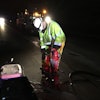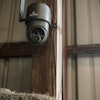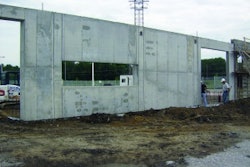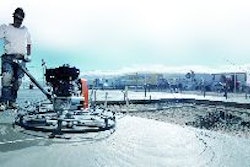
The following information was released by the Center for Public Integrity:
Almost 1,800 special interest groups of all kinds are trying to influence Congress, as it races against time to enact a giant new transportation bill, according to The Transportation Lobby, a new investigation by the Center for Public Integrity.
Notorious for earmarks like Alaska's Bridge to Nowhere, Congress's funding of transportation has become a broken process influenced by special interests, according to the investigation. Interest groups employed 2,100 lobbyists and spent an estimated $45 million to lobby lawmakers on transportation in the first half of 2009 a spending pace on par with the amount spent lobbying on climate change, the Center found.
The Transportation Lobby will feature an interactive map tracking exactly who's hired the lobbyists nationwide ranging from cities, counties, and planning agencies to universities, real estate firms, and construction companies. The Center's project including the map and two stories will be released over two days, beginning with an overview piece on Wednesday, followed by a detailed lobbying story and the map on Thursday.
The Center's investigation is especially timely, given that the existing law governing the nation's surface transportation system expires on Sept. 30, and the House and the Senate are at loggerheads over what to do next. A House subcommittee has passed a six-year, $500 billion replacement bill, but the Senate and the White House are, for the moment, backing just an 18-month extension of current law.
The debate has attracted a cacophony of voices. Among those lobbying:
- More than 475 U.S. cities and 160 counties in 44 states, the vast majority of them seeking funds for specific projects that will be chosen by Congress;
- More than 55 local development authorities nationwide;
- At least 65 private real estate development companies;
- At least 95 transit agencies, 25 metro and regional planning organizations, a dozen individual states, and the national lobbying associations for all three groups;
- More than 75 road and auto organizations, from highway builders and car manufacturers to interstate coalitions and trucking interests;
- At least 65 construction and engineering groups, from cement and steel makers to domestic and foreign-owned builders;
- More than 45 rail organizations, 50 shipping companies and ports, and 45 additional transportation-centric outfits, from bicycle coalitions to research groups;
- More than 140 universities seeking funds for local projects or campus research centers.
The battle over a new transportation bill has also attracted dozens of well-connected lobbyists who have been through these fights before often on the other side of the table. They include:
- At least two dozen individuals with experience as either House Transportation Committee staff or as personal staff to Transportation Committee members;
- More than a dozen individuals with experience on one of the three Senate committees working on transportation policy or as personal staff to committee members;
- At least three dozen former House and Senate staffers with experience working on appropriations committees or as aides for members who served on those committees;
- Former presidential appointees to various positions in the Department of Transportation, including former Secretary James Burnley;
- At least 20 former members of Congress, including one-time House Transportation Committee members Robert Borski, William Lipinski, and Bill Brewster.
The Transportation Lobby also will include a crowdsourcing feature in which citizens nationwide can help identify transportation projects and their lobbyists in local communities.
The Transportation Lobby is supported by a grant from the Rockefeller Foundation.
Support for this and other Center for Public Integrity projects is provided by the Carnegie Corporation of New York, the Ford Foundation, Greenlight Capital LLC Employees, the John S. and James L. Knight Foundation, the John D. and Catherine T. MacArthur Foundation, the Open Society Institute, the Park Foundation, the Rockefeller Brothers Fund, and many other generous institutional and individual donors.

















